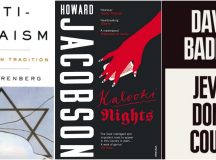Fathom regularly invites writers to select their favourite books on a theme or subject. Here, Fathom film and book reviewer Noga Emanuel picks three favourite Israeli short stories from S.Y Agnon, Rony Lakish, and Etgar Keret.
Tehila by S.Y. Agnon (1950)
Tehila is a long short story that formed part of my high school’s Hebrew Literature syllabus. The unnamed narrator is a visitor from overseas just arriving in the Jerusalem of the 1920’s for some business affairs. He promised a friend to look up his old aunt who lives there but has difficulty finding her place. He stops an old lady to ask for directions and she volunteers to guide him there as she is acquainted with the ‘rabbanit’ (Traditional appellation of a Rabbi’s wife) he is looking for. He describes the lady as ageless, her quick sprightly tread, erect figure and vivacious mind contrasting with her somewhat wrinkle-free face. Seen from behind, she could easily be mistaken for a young maiden. Later, he learns from the curmudgeonly ‘rabbanit’ that the lady was Tehila, ‘Tilly’ to her friends, who has long ago passed her one hundredth birthday. The rabbanit tells him that Tehila is a scion to one of the more illustrious rabbinical families of the diaspora, and used to be herself a great lady of immense fortune, and a business woman.
Jerusalem of the time was small. The Jerusalem of inside the walls was a warren of dark alleys and stone-cut inner courts where mostly elderly pious Jews resided in modest apartments, often consisting of no more than a room with a kitchenette. Tehila lives in one of these rooms. The narrator, however, is staying somewhere in the newly-built modern houses outside the walls. His promise to his friend to check up on the aunt and provide for her whatever small comforts he could has him come and go a few times. As he does so, he often encounters Tehila who is always on some charitable errand for her community. The narrator and Tehila (Hebrew for glory) develop a kind of friendship which culminates in her request of him to help her write a letter. In the process she tells him her life story, a tale of ironic reversals of fortune, anguish and soul-tormenting contrition.
Tehila’s life is marked by fate: As a girl she got engaged, the engagement was annulled because the bridegroom, Shraga, became a Hassid, which displeased Tehila’s orthodox father who rejected Hassidism. After she got married to another man, her husband became a Hassid, while Shraga later spurns Hassidism.
Shraga swore that he would never forgive her, and Tehila believes her subsequent life’s tragedies and woes were punishment for breaking her oath. Her sons die, her daughter goes crazy.
Tehila is tormented by the sin she committed – not asking for forgiveness from Shraga for canceling the engagement. She carries the guilt all her life and tries to atone with her good deeds. In the story Tehila’s husband is not named. Tehila does not love him. Tehila’s sin is guilty consciousness of her duplicity. In her heart she belongs to Shraga, but in her body to her husband.
The ironic twists and turns in the story are too many to register at first reading. Most literary critics adhered to conservative interpretation of the story as a chronicle of piety and an affirmative paean to Tehila’s purity of faith and meek acceptance of the logic of her sin and its punishment.
The first to break with convention was Amos Oz in his fine and original literary analysis of Agnon’s famous short story. He demonstrates what most literary critics before him missed as the thrust of the story – the destructive competition between modernism versus the claustrophobic traditionalism in Jerusalem of 1922. The figure of Tehila represents the old diasporic ways of being and thinking (naïve faith, superstition, fatalism).
Inside Jerusalem’s walls live old God-fearing Jews, waiting to die, in barely inhabitable damp and cold rooms, depending on charity for their most basic sustenance. The narrator is the modern man, brisk, energetic, curious, worldly and politically savvy who commutes for the duration of the story, between the new neigbourhoods outside the walls of Jerusalem, looking to a different future from the slow dying backwards-looking Jewish life inside.
According to Oz, Tehila’s encounter with this modern man sets in motion her rapid decline into old age and madness. Every time he meets her, either by chance or design, the narrator and with him the reader, notice her growing exhaustion, the gradual fading of her vivacity and energy. When the narrator obeys her request to write that letter for her, he visits her in her modest dwelling place and notices her brooding mood and enervation. Concerned, he suggests continuing with the letter sometime later, but she insists on finishing it.
The following day, when he comes to check on her, he is informed that Tehila passed away during the night.
Very few who read the story will disagree that the author has great affection and compassion for Tehila, the old ways of Jerusalem, the grace, kindliness and humour that characterise the old Jewish community. But the obvious ironies tell us he is resolutely eschewing sentimentality or nostalgia for this waning world.
In one scene of the tale, this is demonstrated without further commentary:
Beside me as I stood in my place pressed against the Wall was a Mandatory policeman prodding and spurring with the crop in his hand. What enflamed this man’s heart so to make him so furious? A sickly old woman had brought with her a stool to sit upon. The policeman leapt up and kicked away the stool, knocking the old woman to the ground, and seized the stool, as she had broken the law, enshrined by the lawmakers of the Mandate, that it was expressly forbidden for any worshiper at the Wall to bring something to sit on. The worshippers saw and kept silent, for who could talk reason with one whose mind was made up? And then came that same old woman I knew and stared at him. The policeman cast his eyes downward and returned the stool.
I approached her and said, the strength in your eyes is greater than that in all the promises of England, because while England granted us the Balfour Declaration and sent us all her officials to annul it, you, my dear old woman, lay your eyes on that villain and annulled his wicked intentions. She replied, don’t say such things, he’s a good goy, who saw my distress and gave that poor woman back her stool.
The narrator, the worldly man, observing this incident, decodes it within the larger contemporary geo-political context of the realities in Mandatory Palestine. He feels bitter about the weakness of Jerusalemite Jews, powerless to deal with the callous enforcement of an absurd regulation, and directly expresses his sense of the betrayal of the promise made to the Jewish people in the Balfour Declaration. Tehila, however, looks at it from her own worldview, where supplication for mercy from goyim is the norm. Within the transcendental ethos of her waning world, she can only see the incident through the prism of a ‘good goy’ relenting to the silent entreaties of a distressed old Jewish woman. There is no anger in her.
In the famous interview with Gunter Gaus on German TV in 1964, Hannah Arendt invoked ‘The specifically Jewish humanity signified by [Jewish] worldlessness as ‘something very beautiful [which] Of course … was lost with the passing of all that.’ Arendt gently laments the loss of the beauty of that otherworldliness:
The worldlessness which the Jewish people suffered in being dispersed, and which – as with all people who are pariahs – generated a special warmth among those who belonged, changed when the State of Israel was founded … this humanity … has never yet survived the hour of liberation, of freedom, by so much as minute … You see, that has also happened to us …I know that one has to pay a price for freedom. (From: What Remains? The language remains…)
I believe Amos Oz was utterly accurate in his interpretation of Tehila as a kind of a eulogy for the interiority of Jewish life whose apolitical naïveté had to be shattered by modernity if Jews were to re-enter history. Remember it was written in 1950, about Jerusalem of the early 20’s. There’s no nostalgia for that world, just incredibly mute sadness at the necessity of its destruction if the Jewish people were to endure .
Knock-Knock by Rony Lakish (2004)
(From a collection of 2 novellas and five short stories, entitled: Ra’ash (Noise)
Here is a brief description of three of the more striking stories that linger in my mind.
Pinchassi, a peculiar young man (perhaps what we recognise today as being ‘on the spectrum’), works in a furniture factory, ‘sewing drawers’. He’s the narrator of the long short story Chalalian (Spacenick). His soliloquy is laced with profanity, the quality of which would render any attempt to translate it into English quite futile. One day he notices his refrigerator acting strangely and becomes convinced that a Space entity has inhabited it. This invasion kicks off a series of hilarious events that impact his life routine. The dissonance between the curse-laced language he uses and the purity of that heart is one of the swaying powers of this novella.
In another story, A Distant Noise, Gotlieb, a recently widowed old-timer, wakes up one morning to the sound of a distant noise that only he apparently hears.
And then the short-short story that opens the ensemble, Touk-Touk (Knock-knock) which I once translated and read out (with the author’s permission) to a group of translators at an ALTA convention, and which was agreeably well-received.
I have included this story in my trio for two reasons. Firstly, it is thematically and temperamentally as contrary to Tehila as can be imagined. Secondly, for its personal resonance.
Released in 2004, as Aharon Lakish’s first (and sadly, only fully-fledged) published work, it was immediately noted for its literary virtuosity, rich and precise language and irreverent humour. But what I did not find among the book reviews I perused was recognition of its key element, the absence of malice or, to put it in positive terms, its steadfast adherence to a vision of primal kindness.
Lakish was a high school mate of mine. In 10th form we shared a desk and with the other pair of students’ sitting right in front of us, we formed an odd quartet of co-conspirators, exchanging whispers and written notes roasting each other, the teachers, the material we studied. There was Shlomi the satirical-poetic son of a well-known Israeli author; Boaz, a wickedly funny, tall good-looking Yemenite youth with a perpetual glint of derision in his eye; Aaron, a taciturn lad, with a special talent for math and physics and a quiet shrugging disregard for the humanities; and myself, little miss goodie two-shoes. As far as I know, two of my erstwhile schoolmates are no longer alive; Aaron is one of them.
When in 2006 I became aware of Lakish’s published book, I could not reconcile my memory of his indifference to literature with the sheer bursting talent of his fiction. On first reading his short stories, I was much struck by the fresh cool originality of the voice and subject matter. At a time when most Israeli fiction being produced is heavily spiked with the politics of Israeli society, his stories were unusually bereft of it. If there is a cohesive theme to be discerned in the seven tales, then it would be that of the resigned lonesomeness of introspective or eccentric men in modern society, and what happens when the hedge of their self-imposed isolation is breached. The anonymous narrator in Tehila could not be more different to the anonymous narrator of Knock-Knock. The former was a robust business man, always on the go, keen to meet new people, fully immersed in Jewish traditions and keenly aware of contemporary politics. The narrator in Knock-knock could be any man (though not necessarily Everyman) anywhere. Nothing in the short story tells us who he is, where he lives, what he does for a living. The temporal location can be deduced only from the fact that a sophisticated computer is introduced at some point, only to be forgotten on the table a while later.
The narrator is at home, preparing his supper, when there is an insistent knock on the door. His solitude and peace of mind are rudely disrupted by a stubborn individual who wants to sell him something. After the narrator’s attempts at rebuffing this unwelcome intrusion fail, the undaunted creature manages to enter the apartment, at which point the narrator makes an interesting discovery:
‘But it was not a dear sir at all. It was a lady.’
‘If you could only give me a minute of your precious time, dear sir,’ she said glibly, ’I will tell you how you can take part in…’
‘But I don’t need any encyclopedia’ I demurred, feebly, ‘And how long is a minute?’
‘A minute is a minute’, with this decisive assertion, she extended her right, or left, foot to step into my parlour.
Ah, well. We sat down. She settled into an armchair and placed in front of her a splendid-looking attaché case, stuffed with whatever. Truth be told, she looked quite stylish.
She launched into her monologue, ‘I am the representative for the Bli-Bla-Blo Company. We buy and we sell, address and redress; we also negotiate and we arbitrate for the mega-rational, trans-global workers’ union’s township committee. We have in our possession a few surveys and thousands of questions, for any buyer and any seller. If you were but inclined to be so kind, then of course, it could be operational without being confrontational. When you order a pizza, do you prefer it hot or cold, or with extra toppings?’
When she spoke, her lips moved. Her mouth seemed a little parched. I fetched her a glass of water. She took a long gulp and asked, ‘Well, Mr…?’
‘Look here, Miss, I don’t need any questionnaires, ‘I reiterated, ‘And furthermore…’
‘And answers?’ She hastily interrupted. ‘What will you do if you were asked questions? Today’, she declared categorically ‘everyone needs answers.’
I did not fully agree with her, but she directed a long, unwavering look at me. ‘Hmm, yes, o.k., yes,’ I concurred. ‘How much will all this cost me, anyway?’
‘Three and four…five and six… just a minute, please’. She clicked open her case and took out something. It was an online, laser-synchronised computer with an alternative reality selection, and peripherals for navigational capabilities in underwater databases, and some optional extras. ‘I’ll just log on here, ‘ she said, and did, ’there now, from the info in our possession…’
She then lounged across the armchair, her thighs resting on the armrest. ‘So, what do you say?’
I was hungry. She had invaded just as I was preparing the evening meal. The evening meal is the most important meal of the evening. So, there was nothing to it but offer her a meal, as well.
Afterwards, she joined me for a stroll in the garden. My dog has his needs, and her dog was nowhere to be seen. She had left the printer on my desk. Out in the fresh open air, everything is different. She had curves, and I noticed her hair was pulled up in a ponytail. When we returned from our walk, it was getting cool and late, and there was some agreement between us. Can’t remember what it was about.’
If there is any critique to be discerned in this short-short story, it could be found in the uninterruptable stream of words bubbling from the officious sales agent for Bli-Bla-Blo’s parched mouth and how the narrator, in his attempt to stem the onslaught of ephemeral things he does not want or need or can afford, succeeds in literally dampening her mechanical enthusiasm, by offering water, food and a stroll in a moonlit garden.
The much-missed Norm Geras used to regale his readers from time to time with one of his rascally mood introspections. On one such occasion ‘The bicycles of opinion’, he brings up a remarkably similar critique. It is interesting that in both cases, the absurd had to be deployed in the service of the rational:
Once upon a time there was a severe shortage of opinion. People would go about complaining of and lamenting – and even sometimes bemoaning – this state of affairs. They would wail and cry. To passers-by who passed by with taciturn mien they would call out, ‘Give me an opinion; I need to hear an opinion’. []
And then, one day, someone invented The Sphere. The Sphere was a natty device (so named because of its spherical shape) into which anyone could speak, and have their opinions bruited far and wide. Just like that you could tell anyone who cared to listen that apples were the most boring fruit or that the colour of Tuesdays was orange. []
What happened next was that there was a glut of opinion. There was so much opinion that people didn’t know where to turn first – or second or third. There was so much opinion, it was like the air all around. It came to be hard to know what was opinion and what was just people chatting to one another. In fact, soon no one took opinion to be what it had previously been – the words of the wise and the worried or of the woolly and the wooden. They thought instead: It’s jolly quiet around here – hasn’t anyone got anything new to say? …
Lakish sneaks into his stories the quality of magic-realism. It is so lightly done that we can never be certain whether they were occurrences in the narrative or interior imaginings in the protagonists’ minds. There is nothing ominous about these garnishes, they do not portend catastrophes but they do tell us a lot about the author’s keen awareness of the difference between noise and silence, hyper-active agitation and benign companionable tranquility, life and death. It’s in these magical moments that his stories reveal the worldview of the goodness or kindness of humans. It’s a quality we find in Jorge Luis Borges’s fictional perplexities, a rarefied optimism, if we take the later to be absence of cynicism.
Sadly, this belief, this creed, may be a necessary but not always sufficient condition to keep a person alive in this life.
If I had to define Lakish’s profound humanity I would offer by way of exemplification the poem by an earlier poet and author, Shaul Tchernichovsky’s Creed:
Laugh all you want at my dreams
It is I, the dreamer, who speaks
Mock away my faith in man
Still will I believe in thee
Hole in the Wall by Etgar Keret (1994)
Both Agnon’s and Lakish’s flirtation with magic-realism in their fictional tales is feathery-light, ifdisconcerting . The enigma of Tehila’s extreme old age and her sprightly comportment is never explained. The manner of her (non-suicidal) passing away at a moment of her free choice remains strangely open-handed. In Knock-knock, the little dog that accompanies the lady from Bli-Bla-Blo – whose interaction with Bongo, the narrator’s dog and only companion, facilitates her ‘invasion’ into his life – unaccountably disappears. Whereas Agnon’s use of magic-realism could be attributed to Jewish mysticism, there is no such heaviness in Lakish’s stories. They are surrealistic moments, infused with humour and gracious wit, which the reader takes in stride with something of shrugging concession to authorial quirkiness. These mischievously cryptic occurrences make sense in a non-commonsense way. There’s nothing sinister, disgusting or creepy about them.
Not so in the case of Etgar Keret’s magic-realistic short stories.
Keret’s short short stories also blend the banal and the surreal, but unlike Lakish’s light-heartedness or Agnon’s mysticism, they are dark and even foreboding.
Udi, the lonely protagonist in Hole in the Wall, is twelve years old when he makes a wish at a ‘well’ (a hole in the wall where there ‘used to be an ATM’ which had been removed and never brought back. ‘Somebody once told Udi that if you scream a wish into this hole it comes true.’), so Udi asks for an angel as a friend. Soon thereafter an angel shows up. The angel is everything you would expect an angel not to be: instead of giving, he takes, keeps away from people, and talks endlessly, telling obscure tall tales ‘about places in heaven, about people who when they go to bed at night leave the keys in the ignition, about cats who aren’t afraid of anything and don’t even know the meaning of “scat.”
When Udi, at eighteen, is undergoing basic military training in army’s boot camp, and really needs someone to talk to, the angel disappears for two months, returning when Udi’s ordeal is over.
One Saturday, they sit on the roof and Udi asks the angel to fly, like angels are supposed to. Udi – playfully – gives him a slight shove from behind. He means nothing by it, just wants to make the angel fly a little, but the angel loses his balance and falls down the five stories like a sack of potatoes. Udi, stunned, looks at the motionless figure on the pavement below:
His whole body was completely still, except the wings, which were still fluttering a little, like when someone dies. That’s when he finally understood that of all the things the angel had told him, nothing was true. That he wasn’t even an angel, just a liar with wings.
Why is Udi stunned? Is he stunned by the fact that the angel could not fly in the way angels are supposed to, by the fact that he has just killed an angel or by the realisation that the being he thought was an angel was in fact just a ‘liar with wings’?
Udi – short for ‘Ehud’ itself a conjugated, passive-form verbal word ‘ahud’ meaning ‘well-liked’ – is not at all liked, either by anyone in the story or the reader. That his puppy love for a girl from his school is unrequited may inspire some sympathy but does not surprise. I doubt his author likes him. Yet the story does a brilliant job delivering heartbreak through a wry, grotesque and possibly repugnant sense of humour. Worse, it paints with meanness and ugliness every aspect of life within its frame. The heart-break is rendered through a vision of a world devoid of even a smidgen of solace. The angel whose classical role is to soar, to inspire hope, bring happy news, defy human despair, ends up dragging us downwards, dis-angelically obedient to the rules of gravity. This upending of expectations, of turning things inside out, these ‘malign and nightmarish transformations are a constant in Etgar Keret’s creepily seductive micro-fictions, wrote literary critic Alexander Varty. In Keret’s tales, he further explains, ‘the very fabric of life is warped and strange.’
For all of Keret’s bizarre, implausible, irrational plots of horror and anguish, so deliberately starved as they are of radical hope, the author himself, in interviews, antithetically, exudes charm, genial cuteness, light-hearted sweetness and wit.
I cannot help entertaining a nagging suspicion that Keret’s stories, at least those I read, while technically dazzling, are at core implicitly hollow and chaotic. The very title ‘Hole in wall’ may suggest that the author would not quite disagree with this reading.




































